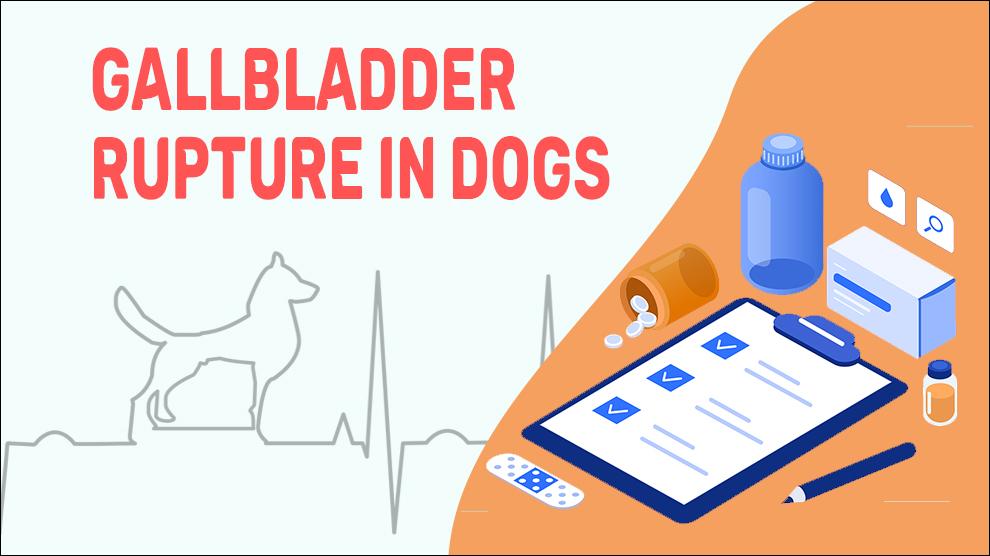A ruptured gallbladder is an ailment where the gallbladder walls burst or break due to inflammation/aggravation of the gallbladder.
Aggravation in the gallbladder is caused by an excessive amount of mucus secretion (mucocele) or by impacted gallstones, which can get trapped inside the gallbladder. This can lead to a bile duct obstruction and inflamed lining of the gallbladder that will, in turn, lead to a rupture.
Ruptured gallbladder results in Bile peritonitis and it is a serious disorder that pertains to injury affecting the lining of the abdominal cavity or the peritoneum. Bile peritonitis caused by an infection kills almost 75 percent of pets. Early intervention is necessary for recovery.
Signs can be chronic or acute. Though, non-infectious gallbladder symptoms are long-term while symptoms for infectious rupture are typically acute.
Symptoms Of Gallbladder Rupture
- Abdominal distension, Abdomen swollen, larger than normal
- Bloating
- Nausea
- Icterus or jaundice (yellowed eyes and gums)
- Hypothermia
- Collapse (if infectious)
- Anorexia
- Vomiting
Treatment Options For Gallbladder Rupture
The treatment of your dog will be directed on the underlying cause of the detachment.
Treatment will be based on the cause of the mucus accumulation or impact of gall stones in the dog's gallbladder.
Cholecystectomy- the surgical removal of the gallbladder will be done for severe cases.
Antibiotics, corticosteroids, and pain medication will be used to control infection and inflammation.
Hypoproteinemia (low level of protein in the blood) is common in some dogs so nutritional support may be provided with the feeding tube.
Other drugs and the need for surgery will be entirely at your vets’ disposal after determining the cause of the leakage.
Home Remedies For Gallbladder Rupture
Follow the instructions given to you by your veterinarian for the entire recommended time period. No matter how badly you want relief for your dogs or what you hear from other dog owners, talk with your vet before trying any home remedy.
Make sure to provide plenty of drinking water.
If any specific diet has been suggested to your dog, follow the diet very strictly, and never provide or allow others to give your dog treats or other food.
Follow all of the veterinarian’s instructions and adhere to your dog's drug schedule properly (don’t miss a dose or overdose).
Prevention Of Gallbladder Rupture
Prevention from rupture of the gallbladder can be done only by preventing underlying causes.
Precautionary use of antimicrobials (β-lactam (e.g., Cefaxolin) combined with a fluoroquinolone or aminoglycoside) has been used to control the risk of peritonitis; though, if this is overused, it may spawn antibiotic-resistant organisms in due course.
Pet owners should discuss how to prevent or decrease the possibility of recurrence of gallbladder problems with their vet.
Affected Breeds Of Gallbladder Rupture
There is no breed disposition. Some breeds are overrepresented.
Shetland Sheepdog, Cocker Spaniel, Miniature Schnauzer
Additional Facts For Gallbladder Rupture
1. Causes:
- Trauma (from injury, being hit by a car)
- Dyslipidemia, or hyperlipidemia
- Gallbladder dyskinesia
- Postoperative complications from a ruptured incision
- Extrahepatic biliary tract obstruction (obstruction of bile flowing from the liver to the gastrointestinal tract)
- Gallbladder mucocele (overdistended gallbladder filled with an inappropriate accumulation of mucus).
- Necrotizing cholecystitis (severe forms of gallbladder inflammation)
- Neoplastic tumor growth (benign or malignant)
- Pancreatic disease
- Gallbladder immotility, Gallstones
- Liver lobe tear
- Peritonitis
- Cholangiohepatitis (inflammation of the bile, liver, gall bladder)
2. Mortality:
Rupture of the gallbladder is considered a medical emergency. The mortality rate due to gallbladder rupture is 20%-50%
3. Diagnosis:
- Complete blood count (CBC)
- Biochemical profile
- Ultrasound and Abdominal x-rays in the liver and gallbladder
- Abdominal fluid biopsy
- Endoscopic retrograde cholangiopancreatography (ERCP)
- Percutaneous transhepatic cholangiogram (PTCA)
4. Prognosis:
The cause of rupture of the gallbladder is indefinite or highly variable, and so is the prognosis. Prevention of a gallbladder rupture may be difficult, as the signs of this condition are often subtle or absent. When you identify that your pet has a predisposing condition, such as Peritonitis, treatment directed to prevent peritonitis will be performed.
When To See A Vet
An appropriate diagnosis of this disease is always best left to your vet to make sure that it is not progressing into a serious form.
As in many cases, the Gall bladder rupture etiology is often serious in nature and it has to be treated early and efficiently.
Food Suggestions For Gallbladder Rupture
Conclusion
Regular follow-up appointments with your veterinarian are essential as recovery would be slow. Always follow the progress and adjustment of the drugs or treatment techniques as necessary.

















